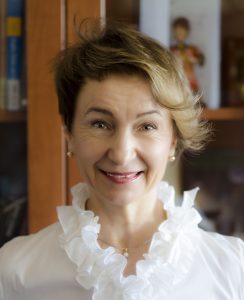Marek Reformat – Irina Perfilieva – Stefania Costantini
Marek Reformat
 Prof. Marek Reformat received his M.Sc. degree (with honors) from Technical University of Poznan, Poland, and Ph.D. from University of Manitoba, Canada. He is a Full Professor and Associate Chair of the Department of Electrical and Computer Engineering, University of Alberta.His research activities focus on development of methods and techniques for intelligent data modeling and analysis leading to translation of data into knowledge. He uses the concepts of Computational Intelligence – with fuzzy computing and possibility theory in particular – as key elements necessary for capturing relationships between pieces of data and knowledge, and for introducing human aspects to data analysis and decision-making processes resulting in more human-aware and human-like systems. He has published over 100 peer-reviewed publications in the areas of computational intelligence, knowledge and software engineering. He is an Associate Editor of a number of international journals. He is a past president of the North American Fuzzy Information Processing Society (NAFIPS), and a president of the International Fuzzy Systems Association (IFSA).
Prof. Marek Reformat received his M.Sc. degree (with honors) from Technical University of Poznan, Poland, and Ph.D. from University of Manitoba, Canada. He is a Full Professor and Associate Chair of the Department of Electrical and Computer Engineering, University of Alberta.His research activities focus on development of methods and techniques for intelligent data modeling and analysis leading to translation of data into knowledge. He uses the concepts of Computational Intelligence – with fuzzy computing and possibility theory in particular – as key elements necessary for capturing relationships between pieces of data and knowledge, and for introducing human aspects to data analysis and decision-making processes resulting in more human-aware and human-like systems. He has published over 100 peer-reviewed publications in the areas of computational intelligence, knowledge and software engineering. He is an Associate Editor of a number of international journals. He is a past president of the North American Fuzzy Information Processing Society (NAFIPS), and a president of the International Fuzzy Systems Association (IFSA).
Title: Evidence Theory Approach to Determine States of Hierarchical System
Abstract: Complex systems are composed of multiple subsystems arranged in a multi-level hierarchical architecture. Therefore, distinctive methods suitable for determining the local states of individual components and the global state of the system are needed. Subsystems’ dependence on each other and unreliable inputs make defining definitions of the subsystems’ states challenging. As a result, the state descriptions could contain imprecise terms in the form of data granules. The granules ‘conceal’ partial information and clarity on what values of inputs and states of other subsystems are required to determine the local and global states of the system.
In this presentation, we introduce and describe a novel approach to determining states – local and global – of complex multi-component systems of hierarchical architecture. We use elements of Evidence Theory and adopt a newly developed method suitable for satisfying uncertain targets to assess the system’s states. In our case, the uncertain targets are definitions of subsystems’ states. This process is performed in stages following the system’s architecture. The inputs are used at the lowest levels of the hierarchy, and the processing at higher levels uses the results of lower-level computations. Due to the imprecision of inputs and definitions of subsystems’ states, the proposed approach deals with multiple sources of uncertainty in determining the states. The origins of imprecision are categorized into: 1) uncertainty and ambiguity associated with measured quantities as inputs to subsystems, 2) degrees of imprecision in determining states of subsystems calculated based on the states of other subsystems, and 3) imprecision and incomplete knowledge included in the statements defining subsystems’ states.
Irina Perfilieva
 Prof. Irina Perfilieva, Ph.D., received the degrees of M.S. (1975) and Ph.D (1980) in Applied Mathematics from the Lomonosov State University in Moscow, Russia. At present, she is full professor in the University of Ostrava (CZ) and a Head of Theoretical Research Department in the Institute for Research and Applications of Fuzzy Modeling (IRAFM). She is: the author and co-author of six books on mathematical principles of fuzzy sets, fuzzy logic and their applications; area editor of International Journal of CIS (IJCIS), Soft Computing, editorial board member of the journals: Fuzzy Sets and Systems, Journal of Uncertain Systems, Journal of Intelligent Technologies and Applied Statistics, Fuzzy Information and Engineering. She works as a member of Program Committees of the most prestigious International Conferences and Congresses in the area of fuzzy and knowledge-based systems. She received the memorial Da Ruan award at FLINS 2012 and the best paper award at IFSA 2019. She is an EUSFLAT Honorary Member, and the IFSA Fellow. She received a special price at the 2010 Seoul International Invention Fair and several awards for the best paper, IFSA 2019 as the last. She has two patents.
Prof. Irina Perfilieva, Ph.D., received the degrees of M.S. (1975) and Ph.D (1980) in Applied Mathematics from the Lomonosov State University in Moscow, Russia. At present, she is full professor in the University of Ostrava (CZ) and a Head of Theoretical Research Department in the Institute for Research and Applications of Fuzzy Modeling (IRAFM). She is: the author and co-author of six books on mathematical principles of fuzzy sets, fuzzy logic and their applications; area editor of International Journal of CIS (IJCIS), Soft Computing, editorial board member of the journals: Fuzzy Sets and Systems, Journal of Uncertain Systems, Journal of Intelligent Technologies and Applied Statistics, Fuzzy Information and Engineering. She works as a member of Program Committees of the most prestigious International Conferences and Congresses in the area of fuzzy and knowledge-based systems. She received the memorial Da Ruan award at FLINS 2012 and the best paper award at IFSA 2019. She is an EUSFLAT Honorary Member, and the IFSA Fellow. She received a special price at the 2010 Seoul International Invention Fair and several awards for the best paper, IFSA 2019 as the last. She has two patents.
Her scientific interests lie in the area of applied mathematics and mathematical modeling where she successfully uses modern as well as classical approaches. For the past five years, she has been working in the field of image processing, pattern recognition and the theoretical foundations of deep learning.
Title: Fuzzy sets as manifolds – a new direction in data analysis
Abstract: In the pursuit of data-driven modeling, we arrive at a space with a manifold structure. If the structure is defined, then modeling consists in characterizing objects and their relationships in terms of local coordinates. In the talk, we will focus on the approach to determining the structure of the manifold from the easy-to-understand concept of the fuzzy partition of the universe. We will show examples of image processing.
Stefania Costantini
 Prof. Stefania Costantini is Full Professor from 2005 at the DISIM Department, University of L’Aquila. Research field: Artificial Intelligence (AI). Head of Research Group AAAI@AQ (Artificial Agents and Artificial Intelligence. Research interests. Intelligent Agents: languages, architectures, applications, epistemic logics to model agents’ behaviour, with applications in robotics; Answer Set Programming and its extensions, including resources and preferences, top-down query answering, Epistemic Logic Programming; meta-reasoning and ontologies; cognitive robotics; Complex Event Processing; Inductive Learning + Reasoning; Machine Ethics; applications of the above in Healthcare.
Prof. Stefania Costantini is Full Professor from 2005 at the DISIM Department, University of L’Aquila. Research field: Artificial Intelligence (AI). Head of Research Group AAAI@AQ (Artificial Agents and Artificial Intelligence. Research interests. Intelligent Agents: languages, architectures, applications, epistemic logics to model agents’ behaviour, with applications in robotics; Answer Set Programming and its extensions, including resources and preferences, top-down query answering, Epistemic Logic Programming; meta-reasoning and ontologies; cognitive robotics; Complex Event Processing; Inductive Learning + Reasoning; Machine Ethics; applications of the above in Healthcare.
(Co-)Author of more than 150 international publications indexed by Scopus. Member of the Program Committee of the most important conferences in the AI field, three times (Co-)Chair, General Chair of PAAMS 2020 and PAASMS 2022, member of the Editorial Board of the journal “Theory and Practice of Logic Programming”. President of GULP (Italian Association of Computational Logic). Member of the Steering Committee of AIxIA (Italian Association of Artificial Intelligence). Coordinator for L’Aquila of the National Lab CINI AIIS (Artificial Intelligence and Intelligent Systems). Evaluator for EU, Italian Ministry, Italian and foreign Universities and Institutions. Invited visiting professor: University of Texas at El Paso; Imperial College London; Universidad Politecnica de Madrid and Corunna University; Fundacion Univ. de las Americas, Puebla (MX).
Projects: Vice-Coordinator of Action COST CA17124 “DIGital FORensics: evidence Analysis via intelligent Systems and Practices”, UNIVAQ Node Coordinator in WASP (Working Group on Answer Set Programming, IST-FET-2001-37004)
and CUSPIS (a Cultural Heritage Space Identification System, GJU/05/2412/CTR/CUSPIS). Participant in several European, Italian and industrial projects.
Title: Digital Forensics: a case for Neuro-Symbolic approaches.
Abstract: One main issue which is coped with by Artificial Intelligence in Digital Forensics is image recognition. Convolutional Neural Networks are often used to this purpose and provide good performance. However, the precision they reach on data unseen before is sadly lower that expected, and the network is in general not able to indicate an outcome as «uncertain». We propose an architecture encompassing neural network and symbolic reasoning, in a combination of induction and abduction, implemented via Answer Set Programming, in order to improve the precision of image recognition while also introducing uncertainty.
